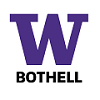Gravitational Wave Astronomy at the University of Washington Bothell

University of Washington Bothell (UWB) faculty and students are active members of the worldwide community of gravitational wave astronomers. Gravitational waves were predicted by Albert Einstein as a direct consequence of his theory of general relativity. In 1993 the Nobel Prize in Physics was awarded to Russell Hulse and Joseph Taylor for their discovery of a binary pulsar and the indirect confirmation of gravitational waves through the measurement of the decay of the orbital period of the star system. The first incident detections of gravitational waves were made in 2015 by the NSF-funded Laser Interferometer Gravitational-wave Observatory (LIGO). The LIGO detection of black hole collisions opens up a new way to learn about distant massive objects in our universe as well as possible unpredicted sources of gravitational waves.
Research
UWB faculty and students work across the spectrum of gravitational wave astronomy including work in data analysis, astrophysics, and parameter estimation. Ongoing research projects include Bayesian analysis, astrophysical parameter estimation, glitch reconstruction, and source modeling.
Student Outcomes
Students have the opportunity to learn data analysis methods, work with real and simulated data, and contribute to gravitational wave astronomy collaborations.
Student Responsibilities
Research students are expected to meet regularly with their research advisor, participate in group research meetings, and present their work at local, national, or international conferences. Students will develop teamwork, collaboration, and communication skills through their work in gravitational wave astronomy at UWB.
Resources and additional content
UWB faculty and students are members of international collaborations working to detect gravitational waves including the LIGO Scientific Collaboration, the NASA and European Space Agency (ESA) Laser Interferometer Space Antenna (LISA), and the North American Nanohertz Observatory for Gravitational waves (NANOGrav). Students have the opportunity to become members of these international collaborations and travel to collaboration meetings to present their work. Members of the UWB gravitational wave astronomy group are engaged in education, outreach, and community activities including the Society of Physics Students (SPS) club at UWB, the American Physical Society (APS) Conference for Undergraduate Women in Physics (CUWiP), the Space Public Outreach Team (SPOT), and the art+science collaboration Celebrating Einstein. Students from any major are encouraged to participate in these community engagement activities.
